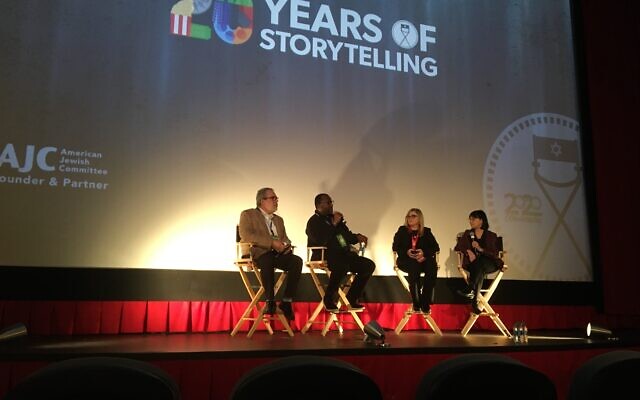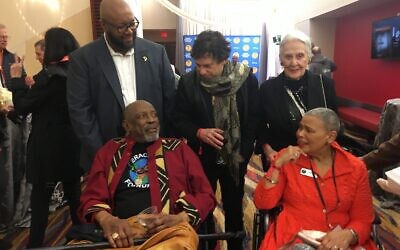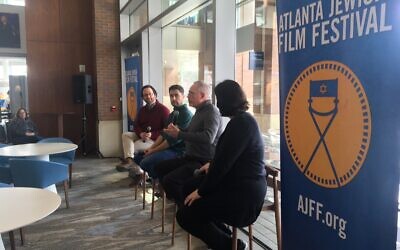The AJFF Has Another Great Year
The Atlanta Jewish Film Festival wrapped up after a successful run.

The Atlanta Jewish Film Festival wrapped up another highly successful run that was marked by an exceptionally strong lineup of narrative and documentary films. The 48 works that were featured, plus four programs of short films, reflected the sharply honed formula of high-quality, carefully selected releases that offered something for almost everyone.
Kenny Blank, the festival executive director for much of its 20-year history, believes that the broad selection of films offered is part of the reason for the festival’s appeal.
“The key to our selection process is diversity,” he said. “Whether you are part of the Jewish community or not, you see something of yourself in the stories that we tell.”
The diverse nature of the festival was reflected in the jury prizes handed out at the end of the festival. The winner of the 2020 Narrative Jury Prize was the Hungarian film, “Those Who Remained,” a sensitive retelling of the relationship between two survivors of the Holocaust in Hungary who are drawn to each other in the years right after World War II.

“This intimately painted picture takes you through depravity, hope, loss and love, and how human connections are formed and nurtured,” according to the citation that accompanied the jury prize.
The prize for best documentary went to “Rewind,” a searing recreation by filmmaker Sasha Joseph Neulinger, who described years of sexual abuse by family members that he experienced as a young child. The film was only shown once, but for many in the audience it clearly left an indelible impression. The illuminating discussion that followed the screening featured three local psychologists and an adult victim of childhood abuse. The absorbing question and answer session went on for a half-hour.
The prize-winning citation read, “This was the documentary jury’s unanimous selection. It’s a brave, uncensored and raw depiction of sexual abuse and the emotional journey to recovery.”
Another important award went to the opening night film, “Shared Legacies: The African-American Jewish Civil Rights Alliance.” It won the Building Bridges Jury Prize that was said to most exemplify “the mission of AJFF, informed by founder and partner American Jewish Committee to foster understanding among communities of diverse religious, ethnic and cultural backgrounds.” The documentary, which had its world premiere at the festival, was capped by a memorable live performance by Peter Yarrow of the 1960s folk group Peter, Paul and Mary and the members of several local church and synagogue choirs.
Not only did the film make a conscious effort to build bridges in the community, but the festival, by the way it highlighted and celebrated the work, made an attempt to highlight the efforts of community leaders to improve racial understanding.

Rabbi Brad Levenberg of Temple Sinai, an AJFF board member, described what he termed as a “tremendous effort and an intentionality” by the board to tackle new programs that reach out to the broader community.
“The board is having a lot of conversations about how to further elevate the role of film year-round, and to educate our young people to the opportunities for bridge-building with groups that are not necessarily connected directly to the Jewish experience.”
Last month, the AJFF initiated a public dialogue with a Sunday morning program that discussed what makes a film Jewish and how that is considered when the final selections for the festival are being made. It’s the first time that the AJFF has set aside time during the festival to create a discussion that was not specifically tied to a festival film.
The hour-long discussion also touched on the changing nature of the film-viewing experience, which is increasingly a part of the world of the internet. The movie-going public, which once made a weekly trip to a movie theater, is now watching many new releases at home on Amazon, Netflix, and Disney+. Last year the American theater box office sales were down 4 percent, the sharpest drop in five years, industry analyst Comscore reported.
According to the White Hutchinson Leisure eNewsletter, in 2018, the average American only spent $32.39 on movie tickets.
Even though the AJFF sold 38,000 tickets during its 20th anniversary this year, changing patterns of how films are marketed and exhibited is an important consideration for the future.
It’s part of a new five-year plan that the board and the professional staff is examining closely, Blank said.
“This anniversary serves as a wonderful opportunity to think about how this festival grows and evolves going forward, to continue to serve the needs of the community, to respond to the dramatic changes in this industry as movie-watching habits have changed, how people consume content, what they expect at a film festival and a film experience.”



comments